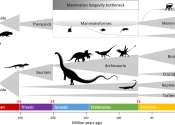A chimp-pig hybrid origin for humans?
(Phys.org) —These days, getting a Ph.D. is probably the last thing you want to do if you are out to revolutionize the world. If, however, what you propose is an idea, rather than a technology, it can still be a valuable ...








